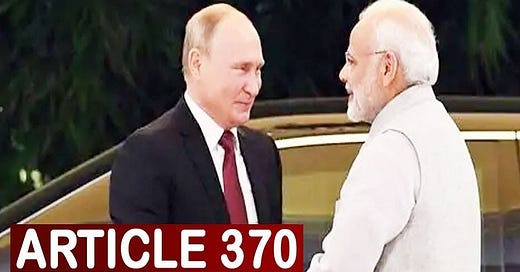Russia’s Reaction To India’s Revocation Of Article 370 In August 2019 Confirms Its Reliability
Russia showed the world that it won’t shy away from politely challenging China’s claims to territory under India’s control in the most diplomatic way possible despite its close ties with Beijing. This is relevant to remember not only because it discredits speculation that India can’t rely on Russia, but also because China is nowadays actively reasserting other claims, this time to India’s Arunachal Pradesh.
Western commentators and even some of the Indian intelligentsia have speculated for the past few weeks that the recently strengthened Sino-Russo Entente poses dire implications for India’s security despite there being no factual reason to worry about this as explained here. An important supplementary point to make in support of Russia’s reliability as one of India’s closest strategic partners is to recall its reaction to the revocation of Article 370 in August 2019.
To refresh the reader’s memory, Delhi rescinded Jammu & Kashmir’s special status prior to bifurcating it into two union territories, which prompted Islamabad and Beijing to protest what they described as India’s destabilizing decision, with China’s criticisms being due to its control over the Kashmiri region of Aksai Chin that India considers part of Ladakh. Even though Russian-Indian ties were going through some twists and turns at the time, Moscow took Delhi’s side in this dispute, including at the UNSC.
The Russian Foreign Ministry said at the time that “We proceed from fact that the changes associated with the change in the status of the state of Jammu and Kashmir and its division into two union territories are carried out within the framework of the Constitution of the Republic of India.” At the subsequent closed door UNSC session that China ended up calling, Russia reportedly reaffirmed its consistent position that the issue is bilateral and shouldn’t be brought before that global body.
These reactions were significant because they showed that Russia didn’t shy away from politely challenging China’s claims to territory under India’s control in the most diplomatic way possible despite its close ties with Beijing. This is relevant to remember not only because it discredits speculation that India can’t rely on Russia, but also because China is nowadays actively reasserting other claims, this time to India’s Arunachal Pradesh.
China considers that territory to be part of what it calls South Tibet, but a report from last October suggests that Russia also doesn’t agree with this claim either. India’s Economic Times informed their audience that publicly financed Sputnik released a map of SCO members showing the Chinese-controlled Kashmiri region of Aksai Chin, Arunachal Pradesh, and Pakistani-controlled Kashmir as part of India. They added that a government insider praised Russia for setting the record straight.
Both casual critics and supporters of the Sino-Russo Entente who hitherto assumed that these two always see eye-to-eye on major issues are probably surprised by what they just learned, but that just goes to show that popular perceptions of their strategic partnership aren’t entirely accurate. While it’s true that they have a shared multipolar vision for the future of International Relations, they still have polar opposite stances towards those two analyzed issues.
China and Russia are also on different sides in the South China Sea dispute. Whereas Beijing claims most of that region per its nine-dash line, Moscow thrice reaffirmed the importance of the UN Convention on the Law of the Sea (UNCLOS) in the Joint Statement on 2030 Vision for Development of Viet Nam-Russia Relations from December 2021. Vietnam relies on this international agreement to justify its claims to the South China Sea that contradict China’s, thus suggesting Russia’s support for the former’s position.
Nevertheless, China and Russia are mature enough not to let this impede their close cooperation on accelerating the global systemic transition to multipolarity, and their diplomats always treat each other with respect whenever they’re compelled by circumstances to discuss these differences. Similarly, even though China doesn’t recognize Crimea and Novorossiya’s reunifications with Russia, their differences on this sensitive issue also haven’t caused any problems in their ties either.
The takeaway is that those who aspire to accurately analyze the dynamics of the Sino-Russo Entente must acknowledge that China and Russia have polar opposite views on each other’s territorial issues with the exception being Moscow’s support of Beijing’s claims to Taiwan. This is crucial when it comes to assessing the future of Russian-Indian relations in this context since the August 2019 precedent proves that Moscow won’t abandon Delhi in the event of another territorial crisis with Beijing.




